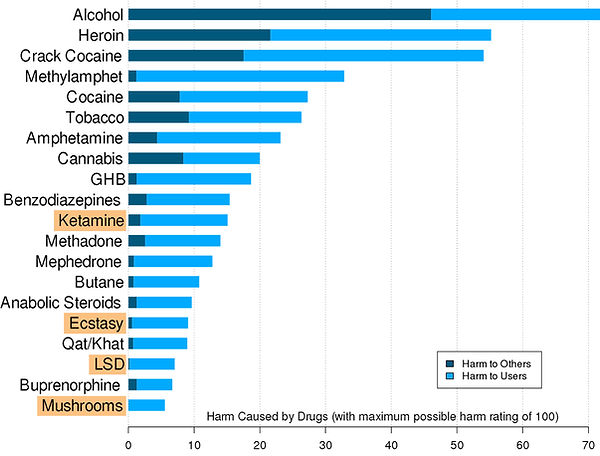Legality & Law
Arguments for Decriminalization
Despite thousands of years of use by humans around the world, psychedelics were abruptly made illegal to supply and possess by a UN convention in 1971 as a consequence of President Nixon’s War on Drugs.
India had no legislation regarding narcotics until 1985. Cannabis smoking in India has been known since at least 2000 BC[1] and is first mentioned in the Atharvaveda, which dates back a few hundred years BC.[2] The Indian Hemp Drugs Commission, an Indo-British study of cannabis usage in India appointed in 1893, found that the "moderate" use of hemp drugs was "practically attended by no evil results at all", "produces no injurious effects on the mind" and "no moral injury whatever". Regarding "excessive" use of the drug, the Commission concluded that it "may certainly be accepted as very injurious, though it must be admitted that in many excessive consumers the injury is not clearly marked". The report the Commission produced was at least 3,281 pages long, with testimony from almost 1,200 "doctors, coolies, yogis, fakirs, heads of lunatic asylums, bhang peasants, tax gatherers, smugglers, army officers, hemp dealers, ganja palace operators and the clergy."
Cannabis and its derivatives (marijuana, hashish/charas and bhang) were legally sold in India until 1985, and their recreational use was commonplace. Consumption of cannabis was not seen as socially deviant behaviour, and was viewed as being similar to the consumption of alcohol. Ganja and charas were considered by upper class Indians as the poor man's intoxicant, although the rich consumed bhang during Holi. The United States began to campaign for a worldwide law against all drugs, following the adoption of the Single Convention on Narcotic Drugs in 1961. However, India opposed the move, and withstood American pressure to make cannabis illegal for nearly 25 years. American pressure increased in the 1980s, and in 1985, the Rajiv Gandhi government succumbed and enacted the NDPS Act, banning all narcotic drugs in India.
During the discussion of the Bill in Parliament, several members opposed it for treating hard and soft drugs as the same. However, the Rajiv Gandhi administration claimed that soft drugs were gateway drugs.
The NDPS Act was criticized in The Times of India. The paper described the law as "ill-conceived" and "poorly thought-out" due to the law providing the same punishment for all drugs, which meant that dealers shifted their focus to harder drugs, where profits are far higher. The paper also argued that the Act had "actually created a drugs problem where there was none." The Times of India recommended that some of the softer drugs should be legalized, as this might reduce the level of heroin addiction.
In 2015, Lok Sabha MP Tathagata Satpathy criticized the ban on cannabis as "elitist", and labeling cannabis the "intoxicant" of the poor. He also felt that the ban was "an overreaction to a scare created by the United States". Sathpathy has also advocated the legalisation of cannabis. On 2 November 2015, Lok Sabha MP Dharamvir Gandhi announced that had received clearance from Parliament to table a Private Member's Bill seeking to amend the NDPS Act to allow for the legalised, regulated, and medically supervised supply of "non-synthetic" intoxicants including cannabis and opium.
In November 2016, former commissioner of the Central Bureau of Narcotics Romesh Bhattacharji said of the law, "This needs to be debated in the face of such stiff ignorance which often takes root in the moral high grounds people take after being influenced by the UN conventions. This law [NDPS Act] has been victimising people since 1985".
To this day, the Indian government persists in claiming that psychoactive substances are classified on the basis of harm, however that are new studies showing the benefits of controlled use and therapeutic use of psychedelics.
Comparison of Psychedelics to Legal substances



